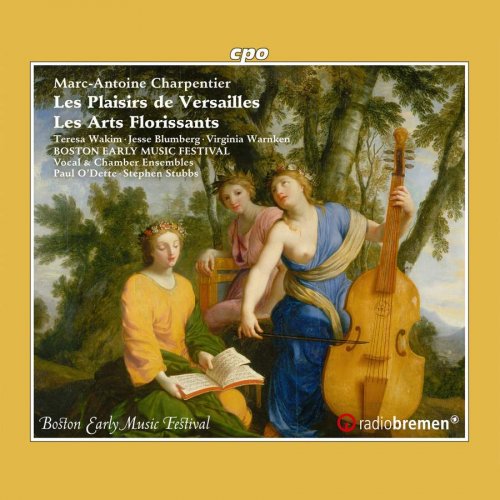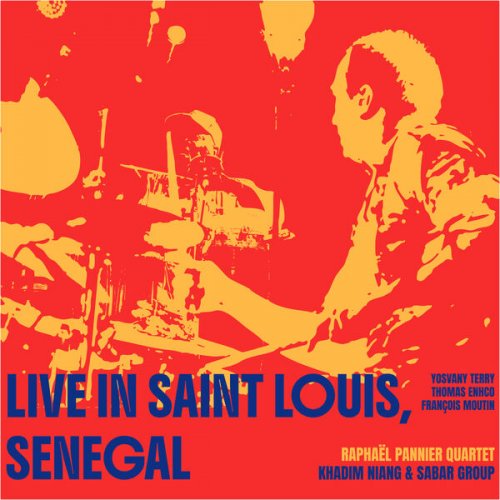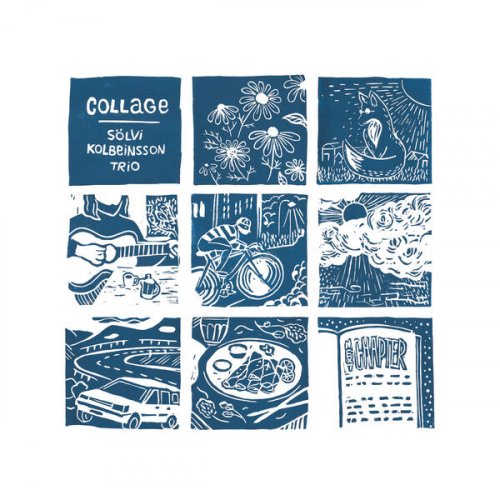Paul O'Dette and Stephen Stubbs - Charpentier: Les Plaisirs de Versailles & Les Arts Florissants (2019) [CD-Rip]

Artist: Boston Early Music Festival Vocal & Chamber Ensembles, Paul O’Dette, Stephen Stubbs
Title: Charpentier: Les Plaisirs de Versailles & Les Arts Florissants
Year Of Release: 2019
Label: CPO
Genre: Classical
Quality: FLAC (image + .cue, log, artwork)
Total Time: 1:15:25
Total Size: 656 MB
WebSite: Album Preview
Title: Charpentier: Les Plaisirs de Versailles & Les Arts Florissants
Year Of Release: 2019
Label: CPO
Genre: Classical
Quality: FLAC (image + .cue, log, artwork)
Total Time: 1:15:25
Total Size: 656 MB
WebSite: Album Preview
Les Plaisirs de Versailles is a silly opera but it is charming and delightful; one can never be annoyed or bored. The music is so fecund in imagination, and so full of memorable ideas and characterisation, and the performers so entrancing that one can easily spend about half hour in simple pleasures and joy – just as did King Louis XIV, the man for whom the opera was written.
The plot? Well, there is none, really, but here is what happens in its four scenes. The main character is La Musique, a somewhat peevish personality, one must admit, whose quixotic character is wonderfully captured by Teresa Wakim. La Conversation, sung by the gorgeous Virginia Warnken, arrives, constantly praises everything around her, and is amazingly patient with La Musique who gets annoyed with her for just talking. The god of banquets, Comus – the majestic Jesse Blumberg – is called upon to mediate. He signally fails, and calls instead upon Le Jeu – the knavish Jason McStoats – who, as his name suggests, advises them to play cards and other games. The main characters continue to bicker with overlapping conversations but it is eventually admitted that civility is the most important thing at court. They all laugh many times over, hoping that the king will do so too. There are some instrumental interludes and dances, and the whole opera is introduced by an overture.
Les Arts Florissants (The Flourishing Arts) is the other one-act opera on this disc, in six scenes. Perhaps it has a slightly more serious purpose than Les Plaisirs de Versailles.
The silvery-toned Terasa Wakim finds herself playing La Musique again, this time along with her fellow Arts: La Poésie, La Peinture, L’Architecture. They sing of how they best can (and have!) pleased the King whose kingdom, now at peace, means that the Arts can fully flourish and be carefree. Unfortunately, La Discorde (the portentous Jesse Blmberg again) and his nasty Chorus of Furies have the power to blow it all away. Now La Paix descends. After a beautiful introductory aria, sung with melting elegance by Margot Rood, Peace argues with Discord but to little or no avail. She then calls upon Jupiter; although he is never heard, he works his magic and dispels the evildoers. Peace calls back the Arts. We await them via an instrumental Prelude and two refined Minuets for strings and recorders. The fifth scene can now establish musical set forms. We have a Chaconne which underpins the trio, and later a Sarabande and Rondeau. “O Peace so long desired / How sweet to taste your fruits…”
What makes these performances such a joy is the ideal portrayal of each character and chorus number, and indeed each detail of the musical presentation. It is all carefully thought through by O’Dette and Stubbs. The sycophantic nature of the plots may be jarring but Louis’s musicians knew where their daily bread came from. They not only did him proud but created these pieces with charm, beauty and delight.
These operas were first performed in the king’s private spaces and rooms (as later did the Rameau’s longer and arguably more sophisticated opera-ballets). It not the plot that matters, but the costumes and sets, and of course the ingenious enactment by the leading performers. Also, the music is of the kind that captures the imagination of the courtiers. In the extensive booklet there are, actually, several photographs of the live performances in which the costumes and décor can be seen, as well as portrait photos of the performers.
The booklet has a clear index of tracks, a detailed history of the instruments used by the Boston Early Music Group, a comprehensive essay by Gilbert Blin on Louis XIV’s court and some of the figures associated with it, and (most significantly) full texts, well translated and in the company of a scene-by-scene synopsis. The recording is vivid and immediate. ~ Gary Higginson, MusicWeb-International
The plot? Well, there is none, really, but here is what happens in its four scenes. The main character is La Musique, a somewhat peevish personality, one must admit, whose quixotic character is wonderfully captured by Teresa Wakim. La Conversation, sung by the gorgeous Virginia Warnken, arrives, constantly praises everything around her, and is amazingly patient with La Musique who gets annoyed with her for just talking. The god of banquets, Comus – the majestic Jesse Blumberg – is called upon to mediate. He signally fails, and calls instead upon Le Jeu – the knavish Jason McStoats – who, as his name suggests, advises them to play cards and other games. The main characters continue to bicker with overlapping conversations but it is eventually admitted that civility is the most important thing at court. They all laugh many times over, hoping that the king will do so too. There are some instrumental interludes and dances, and the whole opera is introduced by an overture.
Les Arts Florissants (The Flourishing Arts) is the other one-act opera on this disc, in six scenes. Perhaps it has a slightly more serious purpose than Les Plaisirs de Versailles.
The silvery-toned Terasa Wakim finds herself playing La Musique again, this time along with her fellow Arts: La Poésie, La Peinture, L’Architecture. They sing of how they best can (and have!) pleased the King whose kingdom, now at peace, means that the Arts can fully flourish and be carefree. Unfortunately, La Discorde (the portentous Jesse Blmberg again) and his nasty Chorus of Furies have the power to blow it all away. Now La Paix descends. After a beautiful introductory aria, sung with melting elegance by Margot Rood, Peace argues with Discord but to little or no avail. She then calls upon Jupiter; although he is never heard, he works his magic and dispels the evildoers. Peace calls back the Arts. We await them via an instrumental Prelude and two refined Minuets for strings and recorders. The fifth scene can now establish musical set forms. We have a Chaconne which underpins the trio, and later a Sarabande and Rondeau. “O Peace so long desired / How sweet to taste your fruits…”
What makes these performances such a joy is the ideal portrayal of each character and chorus number, and indeed each detail of the musical presentation. It is all carefully thought through by O’Dette and Stubbs. The sycophantic nature of the plots may be jarring but Louis’s musicians knew where their daily bread came from. They not only did him proud but created these pieces with charm, beauty and delight.
These operas were first performed in the king’s private spaces and rooms (as later did the Rameau’s longer and arguably more sophisticated opera-ballets). It not the plot that matters, but the costumes and sets, and of course the ingenious enactment by the leading performers. Also, the music is of the kind that captures the imagination of the courtiers. In the extensive booklet there are, actually, several photographs of the live performances in which the costumes and décor can be seen, as well as portrait photos of the performers.
The booklet has a clear index of tracks, a detailed history of the instruments used by the Boston Early Music Group, a comprehensive essay by Gilbert Blin on Louis XIV’s court and some of the figures associated with it, and (most significantly) full texts, well translated and in the company of a scene-by-scene synopsis. The recording is vivid and immediate. ~ Gary Higginson, MusicWeb-International


![Chris Connor - Free Spirits (Remastered) (2025) [Hi-Res] Chris Connor - Free Spirits (Remastered) (2025) [Hi-Res]](https://www.dibpic.com/uploads/posts/2025-12/1765538301_ccfs500.jpg)


![Amira Kheir - Black Diamonds (2025) [Hi-Res] Amira Kheir - Black Diamonds (2025) [Hi-Res]](https://www.dibpic.com/uploads/posts/2025-12/1765640459_tf7wrmc9lqmqc_600.jpg)



![Nicole Zuraitis - Holiday Up EP (2025) [Hi-Res] Nicole Zuraitis - Holiday Up EP (2025) [Hi-Res]](https://www.dibpic.com/uploads/posts/2025-12/1765478937_cover.jpg)